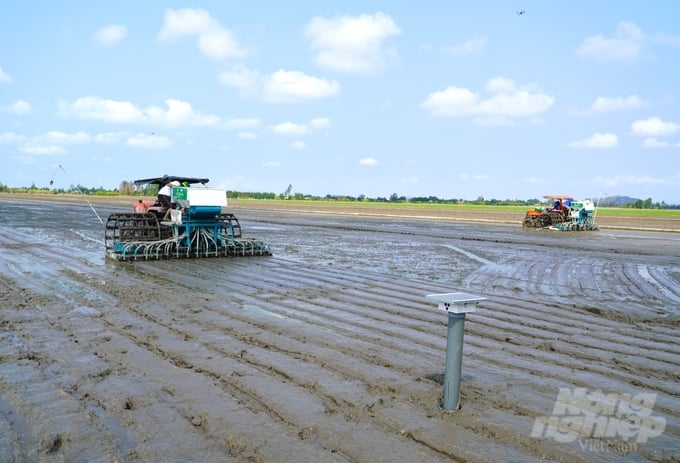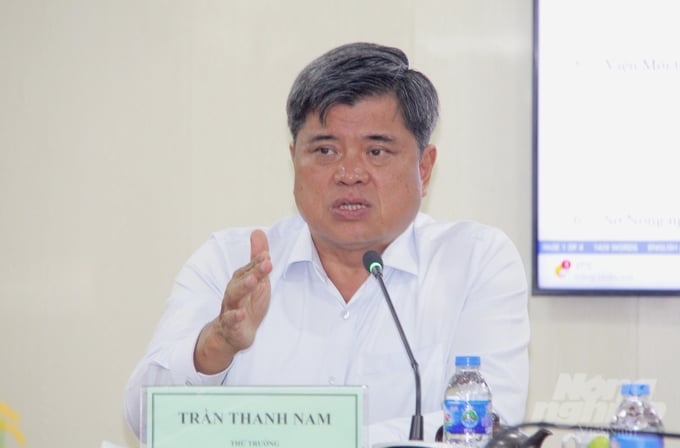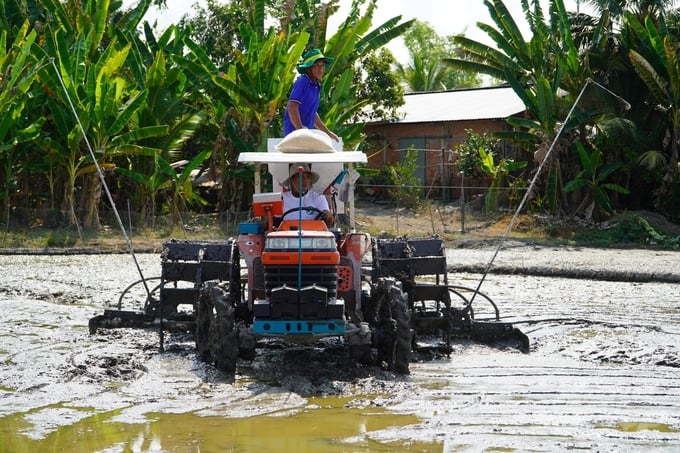May 21, 2025 | 07:49 GMT +7
May 21, 2025 | 07:49 GMT +7
Hotline: 0913.378.918
May 21, 2025 | 07:49 GMT +7
Hotline: 0913.378.918
On May 2, Deputy Minister of Agriculture and Rural Development Tran Thanh Nam chaired a meeting to discuss a number of contents related to implementing 5 pilot models of the Project of 1 million hectares of high-quality, low-emission rice in the Mekong Delta.
The five selected models are located in 5 areas with different climate and soil conditions. The models will take the lead in implementing sustainable rice farming processes, organizing synchronous mechanization, linking product consumption, building rice brands to reduce emissions, improving the capacity of cooperatives, community agricultural extension, and officials at commune, district, and provincial levels; green growth solutions, straw collection, gender equality in production and people's livelihoods...

One of the five pilot models of the 1 million hectares of high-quality, low-emission rice project is being implemented at Thuan Tien Agricultural Cooperative, Thanh An commune, Vinh Thanh district, Can Tho City. Photo: Kim Anh.
Besides, the entire in-field irrigation system must be designed completely. Suitable for soil, high tide, and water sources of ecological regions.
The models will be deployed in 3 seasons: Summer-autumn 2024, winter-spring 2024 - 2025 and summer-autumn 2025.
In particular, in the summer-autumn crop 2024, the models will deploy measurement, reporting, and verification of emission reduction solutions (MRV).
Specifically, Can Tho City's model is expected to be deployed on a scale of about 50 hectares, implemented by Thuan Tien Agricultural Cooperative (Thanh An commune, Vinh Thanh district). In particular, in the summer-autumn crop 2024, the cooperative has started sowing 47 hectares and will continue to expand in the winter-spring crop of 2024 - 2025 and summer-autumn 2025.
Kien Giang province has registered to participate in 340 hectares in the rice-shrimp production area of Phu Hoa Youth Agricultural Service Cooperative (Tan Hoi commune, Tan Hiep district) and Thanh An rice-shrimp cooperative (Dong Thanh commune, An Minh district). ). However, Deputy Minister Tran Thanh Nam requested the provincial Department of Agriculture and Rural Development to study and reduce the above area's scale carefully.
The Department of Agriculture and Rural Development of Soc Trang province agreed to register to participate in 50 hectares at Hung Loi Agricultural Cooperative (Long Duc commune, Long Phu district).
Similarly, Tra Vinh and Dong Thap provinces agreed that the scale of registration of local pilot models is 50 hectares/model. The models will be deployed at Phuoc Hao Agricultural Cooperative (Phuoc Hao commune, Chau Thanh district, Tra Vinh province) and Phu Tho Agricultural Service Cooperative (An Long commune, Tam Nong district, Dong Thap province).

Deputy Minister of Agriculture and Rural Development Tran Thanh Nam requested localities to once again determine the specific area of the point models. Photo: Kim Anh.
After this meeting, Deputy Minister Nam asked localities to once again determine the specific area of the point models, avoiding the situation of "registering one day, changing the next day". In reality, farmers are still worried about whether or not rice productivity will be achieved with the current method.
"The current yield is 6 - 7 tons per ha. Now, we ask people to model sowing 60 - 80kg of rice per ha. Farmers were worried, so they withdrew and did not want to participate. People wanted the locality to keep doing it, and if it was effective, people responded unanimously. Therefore, registered localities must do it," Deputy Minister Nam emphasized.
Regarding the capital source for implementing pilot models, Deputy Minister Nam said that participating localities and the Central Government will jointly spend. In particular, the Central Government will pay for the technical aspects of the model, while localities will pay for materials and infrastructure. There is also the participation and support of businesses.

In addition to technical support, farmers participating in the pilot model of the 1 million hectares of high-quality rice project will receive 100% support for materials and infrastructure. Photo: Kim Anh.
The International Rice Research Institute (IRRI) is also committed to supporting high-quality, low-emission rice farming techniques; Providing machine sowing services (maximum 50 hectares per model); 50% support for certified seed costs (the remaining is supported by local); automatic water level measuring device; Measure agronomic and soil indicators, calculate economic efficiency...
With the above support resources, Deputy Minister Tran Thanh Nam emphasized that farmers participating in pilot models will "not spend anything" to make them excited to participate.
Minister of Agriculture and Rural Development Le Minh Hoan emphasized the project "Sustainable Development of One Million Hectares of High Quality and Low-Emission Rice Associated with Green Growth in The Mekong River Delta By 2030" has an essential meaning in the direction of transforming sustainable rice farming methods in the Mekong Delta; Forming and developing large-scale, stable and long-term concentrated raw material areas, ensuring quality, sustainable and effective farming.
To have enough legal basis to recognize low-emission rice products, the Ministry of Agriculture and Rural Development is coordinating with units and localities in the Mekong Delta to deploy 5 pilot models with at least 250 hectares specializing in high-quality, low-emission rice cultivation. It must work continuously in 3 seasons: summer-autumn, fall-winter 2024, and winter-spring 2025 - 2026.
Translated by Huong Giang

(VAN) Dong Thap farmers attained an average profit margin of 64% during the summer-autumn 2024 crop (first season), while An Giang and Kien Giang farmers followed with 56% and 54%, respectively.

(VAN) As a doctoral student doing research on renewable energy and electrification at Harvard University, the author shares his musings on electricity, nature, and countryside memories.

(VAN) The decree on Extended Producer Responsibility (EPR) ensures transparent management and disbursement of support funds, avoiding the creation of a “give-and-take” mechanism.

(VAN) Hue City rigorously enforces regulations regarding marine fishing and resource exploitation, with a particular emphasis on the monitoring of fishing vessels to prevent illegal, unreported, and unregulated (IUU) fishing.

(VAN) Hanoi People's Committee has issued a plan on reducing greenhouse gas emissions in the waste management sector with 2030 vision.

(VAN) Vietnam's draft amendment to Decree No. 156 proposes a mechanism for medicinal herb farming under forest canopies, linking economic development to population retention and the sustainable protection and development of forests.

(VAN) In reality, many craft village models combined with tourism in Son La have proven effective, bringing significant economic benefits to rural communities.